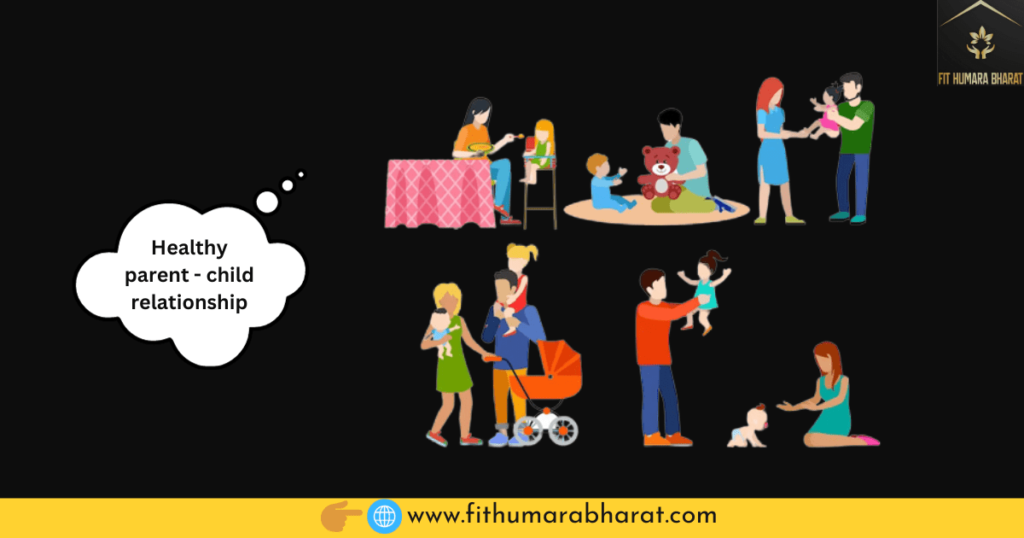Having a child is both a huge honour and a heavy responsibility. The future of our society and the lives of our children will be profoundly affected by this journey. There is no way to put a price tag on a parent’s impact on their child’s development and growth.
Parenting may have a wide range of effects on a child’s physical, emotional, social, and cognitive development, all of which will be discussed in this article. In addition, the characteristics of good parents and examples of their use will be covered.

1. The importance of social connections to one’s well-being.
The cornerstone of a child’s flourishing is their mental wellness. In order for their children to develop emotionally, parents should:
- Provide a loving environment in which their children feel comfortable opening up about their emotions;
- Teaching kids and teenagers to identify and control their emotions is an important part of helping them develop emotional intelligence. Having an adult figure who loves, accepts, and reinforces the youngster may do wonders for the kid’s sense of self-worth and confidence.
2. Attachment and bonding as a means of fostering trust
Attachment and trust in others are formed mostly throughout a child’s first few years of life. The quality of a child’s future relationships is heavily influenced by the ties they develop with their parents at this time.
Being physically close to one another and having positive interactions; being available at all times to listen to and address your child’s concerns; providing care that is trustworthy, reliable, and consistent; and always being present are all necessary components of a healthy parent-child relationship.
3. Communication is indeed the key to comprehending a child’s point of view, feelings, and needs.
In order to promote their children’s healthy development, parents can:
- Giving careful, sympathetic attention to their child as they talk about their concerns and anxieties.
- Promoting open and honest communication so that young people feel heard and appreciated.
- Encourage learning and inquiry with age-appropriate questions and answers.
4. Principles Instruction by Means of Boundaries and Constraints
Instilling self-control, responsibility, and moral principles in one’s children requires parents to set limitations and carry them through. The following must be done for discipline to have any effect at all:
- Set clear, concise, and enforceable ground rules and stick to them.
- Reward and punishment systems for behaviour management.
- Demonstrating respect and ethical behaviour as a role model for children.
5. Learning and Education: Fostering Tomorrow’s Leaders
The intellectual and emotional development of a kid is profoundly influenced by the parenting style of the parents. Early exposure to books that are read aloud might be very beneficial to the development of a child’s language and literacy abilities.
- Using questioning and trying new things to encourage a love of learning and an adventurous spirit.
- Creating a welcoming space where students feel comfortable asking for help with their work and studies.
6. How Role Models Affect Behaviour and Attitude
The beliefs and appropriate behaviours of adults are modelled for their children. Parents must:
- Display the values and principles one hopes their children will internalise.
- Showing through example how to actually get along with others, resolve disagreements, and have fruitful conversations.
- Being a role model by showing kindness and consideration to others.
7. Support and encouragement to foster self-expression
Following these steps can help parents raise kids who are confident in trying new things and taking little risks in life.
- Giving young people the freedom to make their own choices and learn from their mistakes.
- Recognising their efforts and rewarding them for them. 8 Physical Health from a Holistic Perspective
8. Parental involvement in their children’s physical well-being is crucial for several reasons, including:
- Ensuring a healthy diet, regular physical activity, and sufficient rest.
- Including guidance on how to take care of oneself and clean up after oneself.
- Maintaining frequent doctor’s appointments and responding rapidly to health issues.
9. Making Friends and Expanding Social Skills
It is essential for a child’s mental and social development for them to have meaningful interactions with other people and to work on developing their social skills. The following is a list of many methods in which parents may assist in the social development of their child:
10. Educating on nonviolent dispute resolution and promoting positive peer relationships.
- Children’s social development can be aided by play dates, extracurricular activities, and volunteer work.
- Setting a good example when it comes to communicating and building rapport with others.
In order to cultivate intellect and the capacity to solve issues, it is crucial to cultivate an atmosphere that encourages creativity and imagination. One way parents may help their kids develop these qualities is by introducing them to different types of art, music, and creative play.
- Allowing a young person to explore their interests and develop their talents as a result of such exploration.
- Emphasising the importance of effort and persistence in achieving goals rather than innate abilities is consistent with a growth mindset.
Conclusion: The Long-Term Consequences of Parenthood
Being a parent is an ongoing journey that is filled with both highs and lows. Because they shape their children’s present and future, parents have a significant impact on their children’s capacity to build physically and mentally healthy lifestyles. This is because parents help shape their children’s present and future. As a parent, providing a warm and nurturing environment in which your children are encouraged to develop intellectually, emotionally, socially, and physically is one of the most essential things you can do for them.
Parents have a tremendous effect on their children’s growth into self-assured, resilient, and empathic individuals who will go on to make constructive contributions to society if they nurture these traits in them from a young age. Parents may facilitate their children’s growth and development by providing them with love, direction, discipline, and opportunity. The importance of loving and involved parents to the growth, future happiness, and success of their children cannot be overstated. There is no way to adequately express this connection.
Thank You
- The importance of play in promoting healthy child development and maintaining strong parent-child bonds
- The influence of parenting on early childhood health and health care utilization
- Parenting Matters: Supporting Parents of Children Ages 0-8
- Speech and Language Developmental Milestones
- Early childhood development coming of age: science through the life course




 Sources
Sources